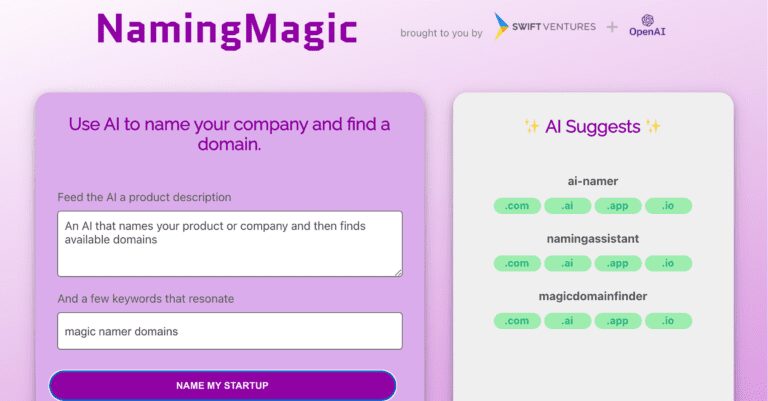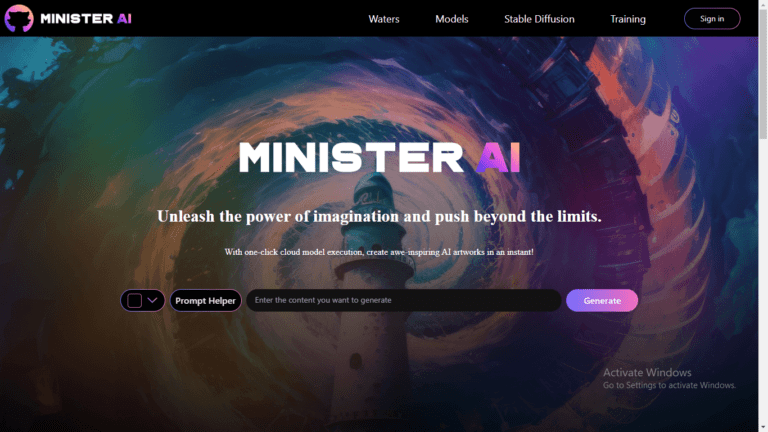If you’ve ever dreamed of becoming an AI engineer, now is the time to realize your ambitions.
The demand for artificial intelligence (AI) and its related sciences has grown significantly in recent years, creating many opportunities for those with the technical know-how and ambition to pursue this cutting-edge career path. But what steps do you need to take to become an AI engineer?
Do you want to know how to become AI Engineer? In our 2023 career guide, we’ll explore the current landscape of AI engineering – discussing trends, education requirements, and recommended skill sets – while showing you how to become an AI professional by 2023 or before!
Table of Contents
- What is AI Engineering?
- Why You Need to Become an AI Engineer
- How to Become AI Engineer: Step-by-step Instructions
- Key Considerations for Becoming a Successful AI Engineer
- How to Become an AI Engineer: 7 Helpful Tips
- What are the Best Courses for Becoming an AI Engineer?
- Machine Learning with TensorFlow by Google (Coursera)
- Deep Learning Specialization by Andrew Ng (Coursera)
- Artificial Intelligence by Columbia University (edX)
- Introduction to Artificial Intelligence by Stanford University (Udacity)
- Natural Language Processing Specialization by deeplearning.ai (Coursera)
- Wrapping Up
What is AI Engineering?

AI engineering involves designing and developing intelligent systems and algorithms that mimic human intelligence. It is a branch of computer science that focuses on building machine learning models and deep learning neural networks optimized for various tasks.
Artificial Intelligence engineers use data science to construct models that can understand, analyze, and process vast amounts of data, making predictions and taking actions autonomously.
Natural language processing (NLP) is one of the most popular applications of AI engineering, allowing machines to interpret and learn from human language.
AI engineering is a fascinating field that blends computer science, data science, and cognitive science to create intelligent machines that can learn and evolve based on their experience.
What Does an AI Engineer Do?
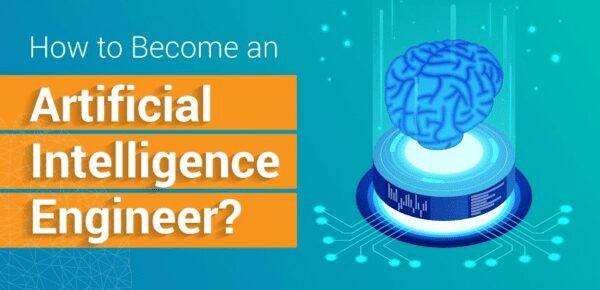
An Artificial Intelligence Engineer is a skilled professional who designs, builds, tests, and deploys AI models. They possess in-depth knowledge of machine learning algorithms and AI technology.
They are responsible for creating complex systems using algorithms to teach machines how to think, learn and respond like humans. AI Engineers must be able to anticipate and respond to new developments in machine learning.
They must also thoroughly understand the hardware and software infrastructure required to develop and deploy AI models.
Ultimately, an AI Engineer aims to create systems that can improve productivity, accuracy, and safety and reduce the need for human intervention.
Why You Need to Become an AI Engineer

Becoming an AI engineer is a brilliant career for anyone interested in computer science and technology. As an AI engineer, you’ll work with cutting-edge technology and play a critical role in developing programs and systems that emulate human intelligence.
To succeed in this field, you must have technical skills and a firm understanding of programming languages, data structures, and algorithms. More and more companies are hiring AI engineers to help them automate processes, improve efficiency and make better business decisions.
Here are some of the benefits of becoming a professional artificial intelligence engineer:
1. AI is the Future: Artificial Intelligence is rapidly changing how we live and work, and AI Engineers will be central to the future of technology.
2. Job Security: Companies across all industries invest heavily in AI technologies, creating a high demand for skilled professionals like AI Engineers.
3. High Salaries: According to Glassdoor, the average salary for an AI Engineer can range from $80k – $150K per year, depending on experience level and location.
4. Cutting-Edge Technology: As an AI Engineer, you’ll work with some of the most exciting new technology out there – pushing boundaries no one else has explored yet!
5. Making a Difference: You’ll be at the forefront of making the world a better place by creating intelligent systems that improve safety and efficiency for everyone.
Education Requirements For Becoming an AI Engineer

To become an AI engineer, you must have at least a bachelor’s degree in computer science or a related field, such as mathematics or engineering. However, many employers prefer hiring individuals with master’s degrees in Artificial Intelligence, Machine Learning, Data Science, or Robotics.
In addition to formal education, gaining practical experience in AI engineering is essential. You can do this through internships, online courses, and research projects. Learning to code in programming languages like Python, C++, and Java is also essential for AI engineers.
On top of this, you’ll need to stay abreast of all the new developments in Artificial Intelligence technology. This means reading blogs and journals written by industry experts and attending conferences and seminars related to your field of study.
How to Become AI Engineer: Step-by-step Instructions
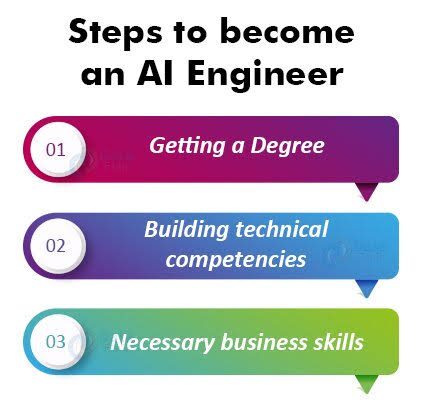
Artificial intelligence has become more prevalent in today’s industry. For Artificial Intelligence professionals, it’s a great time as the demand for their knowledge and skill set is rising.
If you’re interested in becoming an AI Engineer, there are a few steps to follow and a few skill sets to develop.
Earn a Bachelor’s Degree
Start by earning a bachelor’s degree in computer science or a related field like mathematics, engineering, physics, or robotics. Take courses that will help you understand the fundamentals of artificial intelligence and machine learning theory.
Gain Practical AI Experience
Acquire practical experience with AI engineering through internships, online courses, research projects, and coding tutorials. This will give you an edge when applying for jobs.
Build Your Network
Connect with other professionals in the AI industry by attending conferences and joining online forums where you can share ideas and stay up-to-date on the latest trends and technologies.
Learn a Programming Language
Learn a programming language like Python, C++, or Java to help you build AI models. Become proficient in frameworks and libraries like TensorFlow and PyTorch to optimize your programs for various tasks.
Obtain Advanced Knowledge
If you want to take your career to the next level, consider earning a master’s degree in a field related to AI engineering. You can also join professional organizations and pursue certifications demonstrating your expertise.
Stay Current
Stay up-to-date on the latest news and developments in artificial intelligence technology by reading blogs and subscribing to newsletters published by industry experts.
Apply For an AI Engineering Job
Now it’s time to apply for an AI engineering job! Make sure you have a well-crafted resume highlighting your qualifications and experience. You may also need to complete assessments or coding challenges as part of the recruitment process.
Key Considerations for Becoming a Successful AI Engineer

Becoming a successful AI engineer is no easy feat. In a constantly evolving field, one must be equipped with many skills beyond computer science.
Statistical analysis plays a key role in evaluating the success of an AI system, and understanding it is vital to crafting smarter algorithms.
AI engineering is an ever-changing field; you must stay on top of the latest trends and technologies to succeed.
Here are a few key considerations to keep in mind when pursuing a career as an AI engineer:
1. Prioritize Learning: AI engineering is a rapidly changing field, so it’s essential to continue learning new skills and staying up-to-date with the latest technologies.
2. Have Versatile Skills: Most AI engineers need strong coding skills and knowledge of programming languages like Python, C++, Java, etc., but they also need good problem-solving skills and critical thinking abilities.
3. Take Initiative: To stand out from the competition, be proactive and take the initiative. Show that you can come up with ideas and solutions to complex problems.
4. Stay Connected: Join online forums and connect with other AI professionals to stay abreast of the latest news and developments.
Understanding how the human brain works as AI seeks to mimic human intelligence. Skilled AI engineers know that combining these two worlds is crucial in creating efficient, effective, and improved technology over time.
While it may be challenging, mastering these key considerations will lead you toward becoming a successful AI engineer.
How to Become an AI Engineer: 7 Helpful Tips
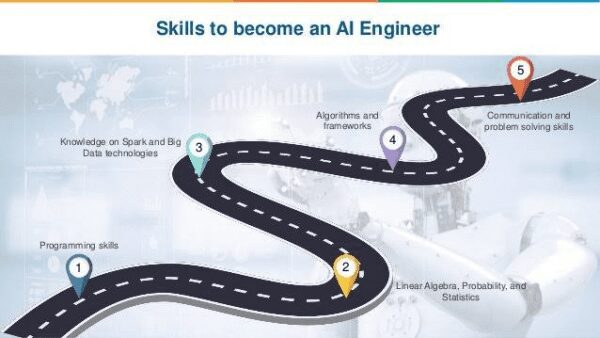
Artificial intelligence has become a ubiquitous technology today, and becoming an AI engineer is an attractive career path. For those who want to break into this field, here are seven helpful tips to consider.
1. Learn to Code: Start by learning a programming language like Python, C++, or Java and become proficient with popular frameworks and libraries such as TensorFlow and PyTorch.
2. Gain Practical Experience: Acquire practical experience with AI engineering through internships, online courses, research projects, and coding tutorials.
3. Stay Up-to-Date: Read blogs written by industry experts and attend conferences and seminars on the latest Artificial Intelligence technology trends.
4. Understand Statistics: Statistical analysis plays a key role in evaluating the success of an AI system; understanding it is essential for crafting smarter algorithms.
5. Build Your Network: Connect with other professionals in the AI industry by attending conferences and joining online forums.
6. Take Initiative: Be proactive and take the initiative to show that you can come up with ideas and solutions to complex problems.
7. Work on Projects: Participate in hackathons, contribute to open-source projects, and build portfolios of AI-related projects.
What are the Best Courses for Becoming an AI Engineer?
For those wanting to become an AI engineer, there are a variety of online or in-person courses that can help you gain the skills and knowledge needed for success.
Here are a few recommended courses:
Machine Learning with TensorFlow by Google (Coursera)
This course teaches you how to use the latest version of TensorFlow and other frameworks like Keras and Scikit-learn. It also covers essential concepts such as linear regression, deep neural networks, and natural language processing (NLP).
Deep Learning Specialization by Andrew Ng (Coursera)
This specialization is designed to teach students the fundamentals of deep learning, including convolutional neural networks, recurrent neural networks, and more.
Artificial Intelligence by Columbia University (edX)
This course covers fundamental topics in AI, such as search algorithms, knowledge representation, logic, machine learning, and robotics. It also provides an introduction to the Python programming language.
Introduction to Artificial Intelligence by Stanford University (Udacity)
This course explores AI from a philosophical perspective as well as from a technical point of view. Topics include supervised learning algorithms, natural language processing (NLP), game theory, computer vision, and robotics.
Natural Language Processing Specialization by deeplearning.ai (Coursera)
Learn how to build models that can understand text using this specialization. Topics include sentiment analysis, text generation, sequence-to-sequence models, and more.
By investing time in these courses and understanding the fundamentals of artificial intelligence engineering, you can position yourself for success in this emerging field.
Wrapping Up
Becoming an AI engineer is an incredible opportunity for those who want to stay ahead of the curve and expand their knowledge.
You can become a trusted and sought-after part of AI engineering with a solid understanding of artificial intelligence systems and firsthand industry knowledge.
With companies now investing in AI programs, many positions are available for those with the right qualifications.
Taking the necessary steps to position yourself as an AI engineer will offer significant career advancement opportunities to drive your future success.
So thoroughly research all your options so you can seize these advantages today!
